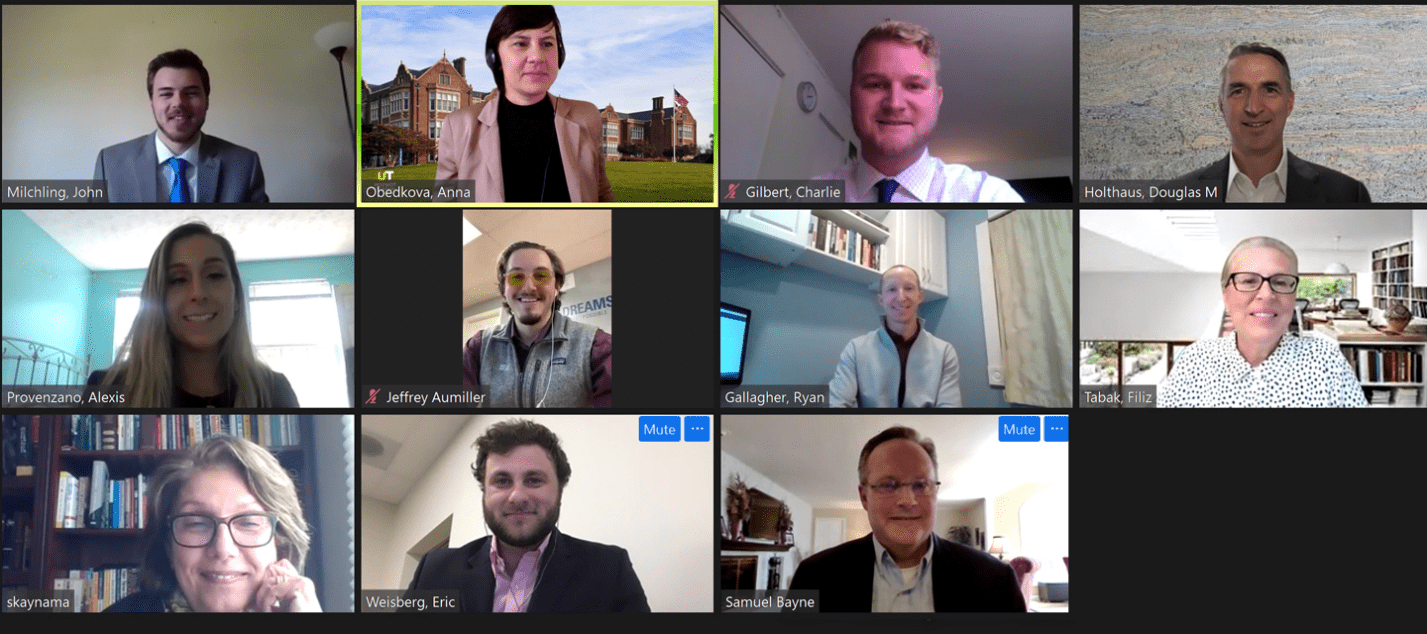
COVID-19 has changed the business landscape in more ways than one. Now a year into the pandemic, organizations are looking to the future, planning and preparing for a post-COVID world. JPMorgan Chase Commercial Banking, the presenting sponsor for this semester’s Live Strategy Case Competition, is no exception.
JPMorgan Chase has provided the business cases for both the fall and spring competitions this year. The challenge issued to spring students was to develop a strategy that will allow the firm’s commercial banking business to adapt and thrive in a post-COVID world.
A total of 12 teams presented their strategies to JPMorgan Chase representatives over Zoom on Friday, April 30th. Executives were impressed with all of the student presentations. “They mentioned that it was really difficult for them to pick the winners this semester because there were so many good strategies to choose from” said Dr. Filiz Tabak, chair of the management department.
However, the judges ultimately selected Captains of Industry, with John Milchling, Alexis Provenzano, Eric Weisberg, Jeffrey Aumiller, and Charlies Gilbert from Dr. Obedkova’s section for first place. The JPMorgan Chase executives “liked the fact that the team came up with multiple strategies” said Dr. Obedkova.
She continued, “They particularly liked idea of partnering with the Chesapeake Bay Foundation because it aligns with JPMorgan Chase’s current priorities to promote involvement in the community.”
Team Tune, with Maxmillian Miller, John Blevins, Jeffrey Binder, and Andrew McBee from Dr. Brannon’s section came in second place.
Finally, team Juliett, with Kaylin Feeney, Tzvi Herman, Samantha Meiskin, Colin Moerman, and Hanna Zarihun from Professor Zuccaro’s class, took third.
About the Live Case Competition: Each semester, CBE hosts the Live Strategy Case Competition, a requirement for all graduating business students enrolled in the MNGT 481 capstone course. The competition features a case study, provided by a business partner, which students analyze throughout the semester. While over 400 students participate in the experience, only the winning team from each section earns the opportunity to present their recommendations to the sponsoring firm’s representatives.
About our Sponsor: JPMorgan Chase Commercial Banking serves emerging startups to midsize businesses and large corporations as well as government entities, not-for-profit organizations, and commercial real estate investors, developers and owners. Clients are supported through every stage of growth with specialized industry expertise and tailored financial solutions including credit and financing, treasury and payment services, international banking and more.
 After almost a year and a half online, the College of Business and Economics welcomed back our students, faculty, and staff for in-person classes in Stephens Hall on August 30. CBE is honored to host more than 3,000 undergraduate and 93 graduate students this Fall 2021 semester. We have been welcoming students both new and old back this week as we all become reacquainted with Stephens Hall and each other. It’s also been a great opportunity to grab some snacks and college swag! CBE is excited to see everyone again and hopes this semester will be successful and safe for all students.
After almost a year and a half online, the College of Business and Economics welcomed back our students, faculty, and staff for in-person classes in Stephens Hall on August 30. CBE is honored to host more than 3,000 undergraduate and 93 graduate students this Fall 2021 semester. We have been welcoming students both new and old back this week as we all become reacquainted with Stephens Hall and each other. It’s also been a great opportunity to grab some snacks and college swag! CBE is excited to see everyone again and hopes this semester will be successful and safe for all students.



